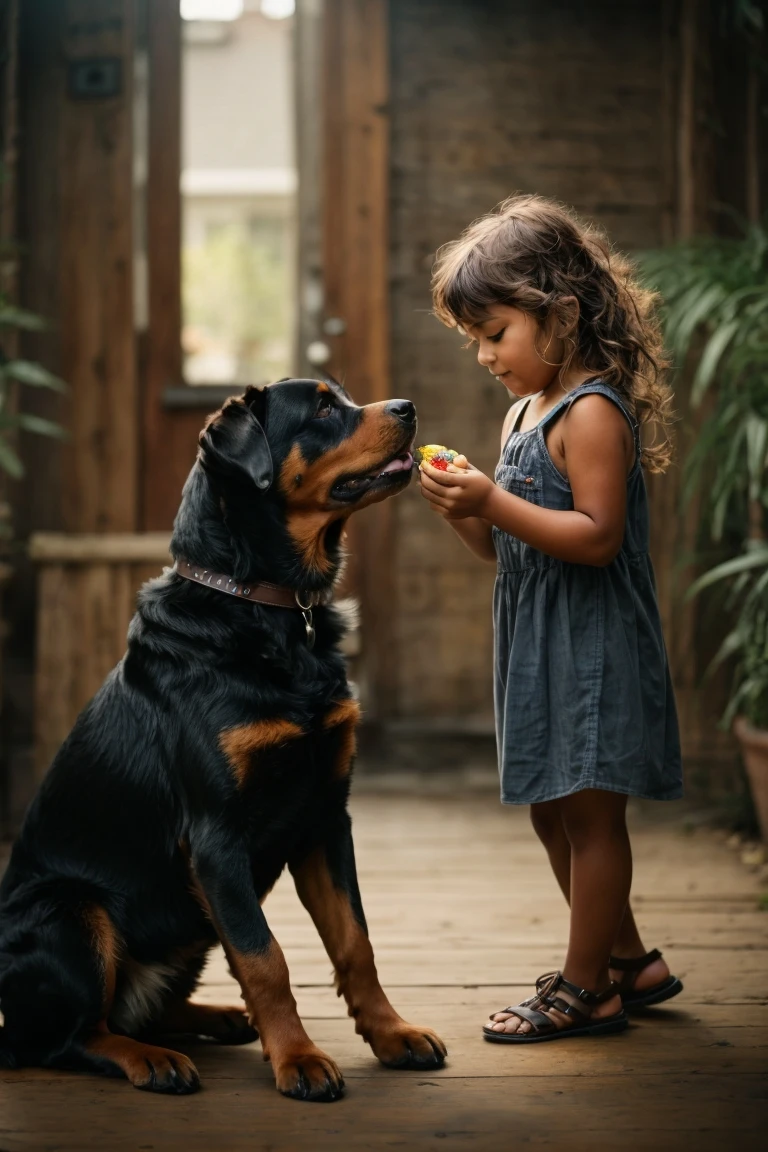Are Rottweilers Good Family Pets?

Rottweilers, with their robust build and powerful stance, have often been met with a mix of awe and apprehension. Originally bred to guard and herd livestock, they carry a legacy of being both protectors and companions. But do these qualities make them suitable for families, especially those with children? Let's delve deeper into understanding Rottweilers, their temperament, and what it takes to raise them in a family setting.
The True Nature of Rottweilers: Understanding Their Temperament
For a comprehensive judgment on whether Rottweilers fit well within a family environment, understanding their inherent nature is paramount:
- Loyal and Loving: Rottweilers deeply bond with their human families. They cherish quality time and aim to win the hearts of their owners.
- Brave Protectors: Their innate protective instincts make them wary of strangers. Hence, early and consistent socialization is indispensable.
- Stable and Confident: A well-raised Rottweiler radiates calmness. They should exhibit neither unwarranted aggression nor timidity.
- Work-driven and Pleasers: They flourish when given tasks, channeling their energy positively, and love to satisfy their owners.
- Sharp and Responsive: Rottweilers are intelligent and respond well to positive reinforcement. They need a strong, guiding hand to steer clear of dominance issues.
Commitment to structured training and understanding ensures their inherent traits become an asset in family settings.
Rottweilers and Children: Tips for a Harmonious Household
A Rottweiler can indeed be a child's best friend, provided they grow together, understanding each other's boundaries. Here's how to ensure this:
- Early Socialization: Introduce puppies to varied environments, diverse age groups, and unfamiliar sounds. Puppy kindergarten is beneficial.
- Child-Dog Etiquette: Educate children about respecting the dog's space and boundaries. Never leave toddlers unsupervised with any large breed, including Rottweilers.
- Structured Training: Emphasize obedience and impulse control. Engage the entire family in training sessions for a collective bonding experience.
- House Rules: Establish boundaries early on. For instance, discourage begging, set feeding schedules, and designate specific areas for the dog.
- Exercise: Ensure daily physical activities like walking, yard play, or jogging to dispel any pent-up energy.
- Time-out: Allow your Rottweiler some downtime, especially when children's play becomes too boisterous.
- Match Energy Levels: An energetic young Rottweiler might be better suited with older children who can match its enthusiasm.
By ensuring structure, vigilance, and proper guidance, Rottweilers can seamlessly integrate into households with children, proving to be affectionate and loyal companions.
Advantages of Rottweilers as Family Companions
When nurtured right, Rottweilers bring numerous benefits to family settings:
- Deep-rooted Loyalty: Often referred to as "Velcro dogs", they form profound connections with family members.
- Training Enthusiasts: Their intelligence combined with their eagerness to please makes them highly trainable.
- Soft-hearted Giants: A well-adjusted Rottweiler can be endearingly gentle and playful.
- Natural Watchdogs: Their mere presence can deter potential threats, and they won't hesitate to alert the family about any anomalies.
- Active Companions: They are excellent partners for outdoor activities like hiking or fetch.
- Versatility: They can adapt to varied living conditions, from apartments to farms, provided their physical needs are met.
For dedicated owners, a Rottweiler's unwavering loyalty, playfulness, and bonding instincts make them an unparalleled family addition.
Challenges to Consider with Rottweilers in Families
However, there are potential challenges to anticipate:
- Size Concerns: Their size can pose risks, especially around toddlers or the elderly.
- Predatory Instincts: Some Rottweilers might chase smaller pets, necessitating supervision.
- Guarding Traits: Without proper guidance, their protective nature might become excessive.
- Cost: They have substantial dietary needs, and other costs like training, healthcare, and damage control can add up.
- Grooming: Their double coat sheds throughout the year, and they can drool quite a bit.
- Housing Restrictions: Some residential communities might not welcome Rottweilers.
- Commitment: They require consistent training, socialization, and quality time, demanding dedicated ownership.
Being proactive and informed ensures these challenges can be effectively managed.
Ensuring Safe Interactions Between Rottweilers and Children
Safety and understanding are pivotal when fostering a bond between Rottweilers and kids:
- Positive Introductions: Familiarize your Rottweiler with children gradually and positively.
- Monitor Interactions: Always supervise and educate children on gentle interactions.
- Skill Training: Commands like "leave it" are essential. Reinforce impulse control.
- Safety Measures: Use gates to separate toddlers and dogs when unsupervised.
- Physical Activity: A well-exercised Rottweiler is more relaxed and manageable.
- Personal Space: Ensure your Rottweiler has a designated quiet space.
- Behavior Management: Train against undesirable behaviors like mouthing or jumping.
- Neutering/Spaying: This can reduce certain unwanted behaviors.
With consistency, understanding, and structure, Rottweilers and children can cohabit harmoniously.
Rottweilers for First-Time Owners: Points to Ponder
Rottweilers might not be the best choice for novice dog owners due to:
- Their substantial size and potential dominance.
- The need for a seasoned hand at training.
- High exercise and socialization requirements.
- The skill required to interpret their body language.
- The potential challenges of raising an exuberant Rottweiler puppy.
However, if a first-time owner is committed to learning and providing for the dog's needs, an adult Rottweiler with a known temperament might be a good fit.
Choosing a Credible Rottweiler Breeder
To ensure a healthy and well-tempered Rottweiler:
- Prioritize breeders focusing on health and temperament over mere appearance.
- Ensure health checks for common issues like hip dysplasia.
- Opt for breeders who treat their dogs as family, not just breeding machines.
Avoid breeders who prioritize quantity over quality. Associations and breed clubs can guide you to responsible breeders.
In Conclusion
Rottweilers, with their unwavering loyalty and protective nature, can indeed be treasured family members. Commitment to their training, understanding their needs, and establishing a structured environment can ensure that the bond between a Rottweiler and its family thrives. With the right approach, they can be both gentle companions and vigilant protectors in a family setting.